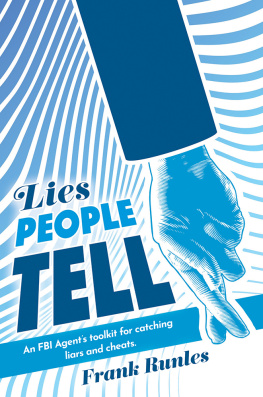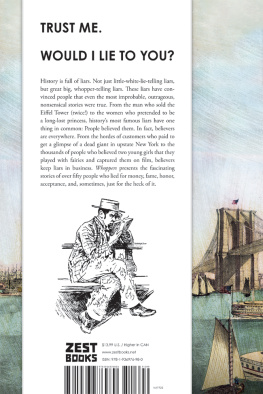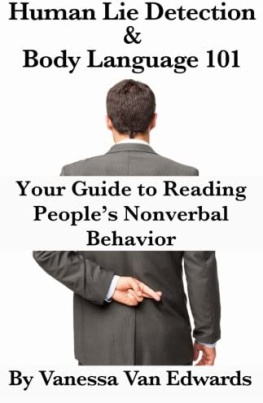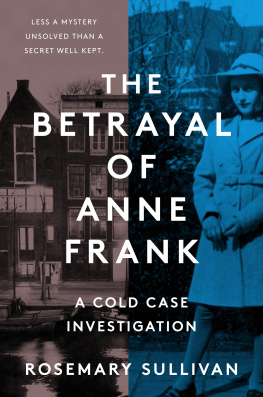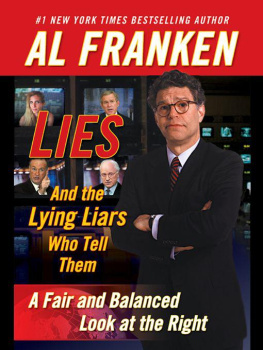All rights reserved. This book or any portion thereof may not be reproduced or used in any manner whatsoever without the express written permission of the publisher except for the use of brief quotations in a book review.
For my wife, Karrie. Thanks for believing. Youre my rock and I love you.
For my daughter, Natali. You are the love of my life and keep me young.
For my friend, Lisa Barber. Thanks for giving me the inspiration for this book.
Introduction
You ever have that feeling you are being lied to? That the person you are talking to is not being honest with you? Maybe you cant quite put your finger on it, but a little voice tells you something is not quite right.
Listen to that voice, because it is telling you something important.
The amygdala is the oldest part of the human brain, and it tells us when there is danger nearby. It is the part of the brain that governs your senses and allows you to react to danger and threats.
In the distant past of human evolution, the amygdala played a much larger part of everyday life. The caveman may not have seen the saber-tooth tiger lying in wait in the tall grass, but the amygdala sent him a signal, whether through scent, sight, or sound, that there was danger nearby and he went on high alert.
But with the advance of civilization and society, we dont listen to our amygdalae anymore. We blithely (and incorrectly) believe we are safe or that we already know the dangers around us.
We may not have to watch out for saber-tooth tigers today, but, believe me, predators are stalking unsuspecting people all the time.
Deceit and playing fast and loose with the truth have become accepted in modern society. With the rise of technology and in the age of information overload, we have been lied to and deceived so frequently that we, as a society, have become immune to it.
Our political leaders deceive us with slick double talk. We are fed a steady stream of disinformation and fake news. Slick salespeople hook us into buying things we dont need or dont deliver as promised. It is so prevalent that we dont even notice it anymore. We just shrug our collective shoulders and say, Its just the way it is.
It Doesnt Have to Be This Way
Unchecked and undetected deception can have many negative effects on our lives and on our familys well-being.
Have you ever said to yourself, If I had known what I know now, I wouldnt have done that , or I cant believe I fell for that load of BS! I have. We all have.
When we are deceived, we can lose our money and lessen our power to provide for and protect our family.
Our status in our community can be compromised and our self-worth diminished.
When we realize weve been duped, were angry! We want vengeance. We want to get back at the villain. Unfortunately, that almost never happens, and we are left feeling defeated and betrayed by the world.
Its just wrong.
The Genesis of This Book
When I was new FBI agent, my first assignment was Buffalo, New York. For some unknown reason, in the 1990s, Buffalo, New York, was a hotbed for telemarketers with numerous telemarketing boiler rooms operating in the Buffalo area. The problem was significant enough that the Buffalo FBI office started a telemarketing task force to address the problem to which I was assigned.
Once assigned to the task force, I started an investigation of a telemarketing group operating out of a boiler room on Delaware Avenue that specifically targeted senior citizens who had been previously scammed by other telemarketers. They called themselves WNY Recovery Inc. WNY Recovery Inc guaranteed their victims they would recover all of the senior citizens previously lost money for a small ten percent fee, paid up front, of course.
In the world of telemarketing, lists of people who are having financial problems or who have recently won or inherited large amounts of money are bought and sold. Even more nefarious, lists of prior telemarketing victims are also bought and sold. These victims have already shown a penchant for falling for the slick talk of a telemarketer. They are like pre-approved victims.
I know people will say, Hey, if youre dumb enough to fall for this once or, even worse, twice well, too bad for you. But consider how easily your mom, dad, grandfather, or grandmother could be victimized by a slick fraudster.
I spent weeks calling and interviewing these victims. Most were very reluctant to admit that they had been defrauded a second time. Many had never told anyone that they had been defrauded the first time. There was a lot of shame and embarrassment.
This is where I started to really learn how to interview people. I had to gently coax the truth out of the victims using the few interviewing tools I possessed at that time in my career.
After interviewing these victims, it was clear that they were very trusting people and totally clueless when it came to be being deceived. It was heartbreaking to hear their stories of how they lost their meager savings and how it had destroyed their financial security.
Im telling you, when you hear a eighty-year-old woman sobbing on the phone telling you how she trusted the nice young man when he promised to get her money back, it changes you. Thinking back on it still makes me angry.
I learned a few things during this investigation.
One, I have a knack for interviewing people and getting them to open up to me. This was probably my greatest asset as an FBI agent. If an agent cant talk to people, they are ineffective (and probably will end up in FBI management!).
Two, because people arent informed, they are easily fooled.
Three, to be a better investigator, I needed to learn as much as I could about detecting deception.
I spent the rest of my FBI career learning and researching how to effectively detect deception. I became a better interviewer and investigator because of what I had learned. So, after all these years, I decided to write this book to share what I have learned over my 20 year FBI career.
I never want to see someones future stolen because they dont know what I know. After decades of protecting the American public, I feel obligated to share what I have learned through years of experience, training, and research in the area of deception.
My hope is that after you have finished this book, you will listen to what people say in a different way. You will read things in a different light. For lack of a better term, your BS meter will be pegged out!
If you practice what I will teach you in the following pages, I promise the following:
- You will recognize when someone is trying to deceive you.
- You will become a better communicator.
- You will understand people better.
- You will be better armed to protect your family and your money.
- You will become more successful.
This book is not an academic tome. It is meant to be a common sense, easy-to-read, and, hopefully, entertaining guide that helps you recognize the various ways people try to deceive us every day. That is not to say what I teach isnt backed up by research. It most definitely is. The lessons in this book are drawn from research done by such esteemed researchers as Susan H. Adams and John P. Jarvis (2006), Judee Burgoon and Tiantian Qin (2006), Stephen Porter and John Yuille (1996), Don Rabon (1996), Avinoam Sapir (1987), Wendell Buddy Rudacille (1994), and many others.

